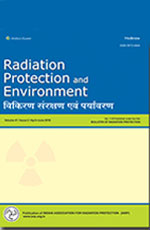- Homepage
- SCIENTIFIC PROGRAMME
SCIENTIFIC PROGRAMME
The scientific programme of the congress will include keynote addresses, Panel Discussions, Invited Talks, Proffered Papers, Posters and Technical Exhibition.The major scientific thematic areas to be covered at the congress are listed below:
Topic 1. Foundation Topics on Radiation Protection Philosophy and Risk Estimates
- T1.1 Health effects, risk assessment of radiation including biological mechanisms and exposure characteristics
- T1.2 Radio-ecology, processes influencing radionuclide transfers and stress to the receptors
- T1.3 Social, psychological and economic impacts of radiation exposure situations
- T1.4 Perspectives from ethics, social sciences and humanities
- T1.5 Tools and quality criteria for epidemiology and radiation risk assessment
- T1.6 Integrated approach to assess radiological risk to biota
- T1.7 Education & Training
Topic 2. Radiation Safety and Protection in Nuclear Facilities
- T2.1 Mining and mineral processing and implementation of circular economy
- T2.2 Nuclear power plants (including research reactors)
- T2.3 Nuclear fuel cycle facilities
- T2.4 Transport of radioactive materials, and waste management and disposal
- T2.5 Decommissioning
Topic 3. Radiation Safety and Protection in Medical and Industrial Sectors
- T3.1 Radioisotope facilities (including sealed sources & radiation facilities)
- T3.2 Design and radiation safety in medical, industrial and accelerator facilities
- T3.3 Radiation metrology and standards
- T3.4 Radiation safety during diagnosis and treatment of patients
- T3.5 Beneficial applications of radiation technologies
- T3.6 Medical and industrial application of Non-Ionizing Radiations (NIR) and their protection standards and regulations.
Topic 4. Radiation Dosimetry (External, Internal and Biological)
- T4.1 Measurements and assessment of radiation in workplace environment
- T4.2 Internal contamination monitoring, biokinetic models and dose assessment
- T4.3 Personnel monitoring
- T4.4 Numerical and computational methods
- T4.5 Retrospective dosimetry and medical management
Topic 5. Nuclear Instrumentation and System Development
- T5.1 Radiation detectors and monitoring systems
- T5.2 Monitoring methodology and strategy
- T5.3 Newer types of radiation detectors, systems and tools
- T5.4 Spectrometric techniques
- T5.5 Artificial Intelligence and Machine Learning
Topic 6. Environmental Monitoring and Assessment
- T6.1 Environmental radioactivity measurements: Radionuclide fate and behaviour in terrestrial, atmospheric and aquatic environment
- T6.2 Processes controlling distribution of radionuclides in marine environment
- T6.3 Meteorological studies, environmental modelling and dose assessment
- T6.4 Radioisotope techniques and research in climate change studies
- T6.5 Environmental sampling, criterion and strategies
Topic 7. Existing Exposures
- T7.1 Radon and thoron
- T7.2 Terrestrial radiation and radionuclides in ground water
- T7.3 Cosmic radiation including space
- T7.4 Public exposures from Naturally Occurring Radioactive Materials (NORM) and Technically Enhanced Naturally Occurring Radioactive Materials (TENORM)
- T7.5 Legacy sites of radioactive contamination
Topic 9. Regulatory Framework: System of Protection, Standards and Regulation
- T9.1 Implementation and application of justification and optimization principles in radiological protection
- T9.2 International and national regulatory guidelines
- T9.3 Protection standards for special populations (including pregnant women, children, carers and comforters)
- T9.4 Influence of dose response models on standards and regulations (assessing risks at low doses and dose rates)
- T9.5 Future developments in the system of radiological protection
- T9.6 Industrial hygiene and safety practices in radiation facilities
OUR EVENTS
-
IARP RSO GIC Application Form
-
Election Results 2024-25
-
NECE - 2024
-
IARP AGM Report 2022 – 2023
-
IARP RSO NG Application Form


